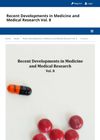 4 citations,
August 2011 in “Aktuelle Dermatologie”
4 citations,
August 2011 in “Aktuelle Dermatologie” Topical melatonin is a safe treatment that may reduce hair loss in people with androgenetic alopecia.
 3 citations,
April 2019 in “Journal of Dermatological Treatment”
3 citations,
April 2019 in “Journal of Dermatological Treatment” Caffeine shows promise for treating some types of hair loss, but more research is needed.
 3 citations,
January 2018 in “İstanbul Kuzey Klinikleri”
3 citations,
January 2018 in “İstanbul Kuzey Klinikleri” Hair loss was found in 37.4% of surveyed rural high-school students in Eskisehir, Turkey, affecting their quality of life, especially in general health and mental well-being.
 2 citations,
April 2017 in “Asian Journal of Psychiatry”
2 citations,
April 2017 in “Asian Journal of Psychiatry” Valproic acid can cause hair loss when taken orally but may promote hair growth when applied topically.
 1 citations,
December 2018 in “Journal of Cosmetic Dermatology”
1 citations,
December 2018 in “Journal of Cosmetic Dermatology” Men with thinner hair from genetic hair loss may be more likely to have an enlarged prostate.
 1 citations,
January 2017 in “Elsevier eBooks”
1 citations,
January 2017 in “Elsevier eBooks” The document concludes that new treatments for hair loss may involve a combination of cosmetics, clinical methods, and genetic approaches.
 May 2024 in “Journal of drug delivery and therapeutics”
May 2024 in “Journal of drug delivery and therapeutics” PRP therapy helps improve hair growth and is safe for treating hair loss.
 June 2023 in “Buletin de psihiatrie integrativă”
June 2023 in “Buletin de psihiatrie integrativă” Alopecia causes significant emotional distress and psychological issues, requiring combined skin and mental health treatment.
 April 2021 in “Journal of Investigative Dermatology”
April 2021 in “Journal of Investigative Dermatology” An AI photographic device effectively tracked hair growth improvements in women treated for hair loss.
 May 2003 in “Facial Plastic Surgery Clinics of North America”
May 2003 in “Facial Plastic Surgery Clinics of North America” Hair loss can be treated with medications like minoxidil and finasteride or surgery, but treatment effectiveness varies by alopecia type and accurate diagnosis is important.
 19 citations,
July 2015 in “Journal of Ginseng Research”
19 citations,
July 2015 in “Journal of Ginseng Research” Korean Red Ginseng may protect against hair loss caused by chemotherapy.
 8 citations,
January 2013 in “BioMed Research International”
8 citations,
January 2013 in “BioMed Research International” Age, gender, and hair loss affect scalp characteristics differently in young Caucasian adults.
 September 2024 in “Stem Cell Research & Therapy”
September 2024 in “Stem Cell Research & Therapy” HA-stimulated stem cell vesicles improved hair growth in male mice with androgenetic alopecia.
 63 citations,
March 1995 in “International Journal of Dermatology”
63 citations,
March 1995 in “International Journal of Dermatology” Some drugs can cause hair loss, and stopping these drugs often leads to hair regrowth.
 29 citations,
September 2014 in “American Journal of Dermatopathology”
29 citations,
September 2014 in “American Journal of Dermatopathology” Horizontal sections of scalp biopsies are good for diagnosing Central Centrifugal Cicatricial Alopecia and help customize treatment.
 28 citations,
May 2012 in “Veterinary Dermatology”
28 citations,
May 2012 in “Veterinary Dermatology” Different types of dog hair loss are linked to problems starting the hair growth phase and early hair cycle ending.
 44 citations,
September 2012 in “Archives of Dermatology”
44 citations,
September 2012 in “Archives of Dermatology” Hair breakage may be an early sign of a hair loss condition called CCCA in African American women.
 4 citations,
October 2018 in “Experimental Dermatology”
4 citations,
October 2018 in “Experimental Dermatology” Dermoscopy shows that diffuse alopecia areata progresses through specific hair growth stages.
 8 citations,
April 2020 in “Journal of Ethnopharmacology”
8 citations,
April 2020 in “Journal of Ethnopharmacology” Herbs might help with hair loss, but more research is needed to confirm their safety and effectiveness.
 May 2015 in “Cancer Research”
May 2015 in “Cancer Research” A new treatment may prevent hair loss from chemotherapy by normalizing scalp cell death and reducing inflammation.
 October 2014 in “Cancer Research”
October 2014 in “Cancer Research” A new topical treatment may prevent hair loss from cancer therapy by adjusting cell death processes in hair follicles.
 January 2023 in “Skin appendage disorders”
January 2023 in “Skin appendage disorders” Low-dose oral minoxidil may help treat hair loss but is not FDA-approved and can cause side effects like unwanted hair growth and heart issues.
 October 2021 in “Book Publisher International (a part of SCIENCEDOMAIN International)”
October 2021 in “Book Publisher International (a part of SCIENCEDOMAIN International)” Antioxidants and growth factors may help treat hair loss when combined with LED and Laser therapy.
 September 2017 in “Journal of Investigative Dermatology”
September 2017 in “Journal of Investigative Dermatology” HIF-1A may aid hair growth, Backhousia citriodora improves skin, autologous cells stabilize hair loss, infrared thermography assesses alopecia, and a new treatment preserves hair.
October 2015 in “CRC Press eBooks” Classifying alopecia helps diagnose and treat different types of hair loss accurately.
 12 citations,
April 2020 in “British Journal of Dermatology”
12 citations,
April 2020 in “British Journal of Dermatology” Caffeine may help reduce stress-induced hair loss.
 2 citations,
May 2023 in “JAAD Case Reports”
2 citations,
May 2023 in “JAAD Case Reports” The document concludes that early and accurate diagnosis of hair loss on the top of the scalp in Black men is important to distinguish CCCA from other types of hair loss.
 May 2024 in “Chemical engineering journal”
May 2024 in “Chemical engineering journal” New treatment using Minoxidil and EGCG with ionic liquids improves hair growth and quality for hair loss.
 July 2023 in “Journal of Clinical Medicine”
July 2023 in “Journal of Clinical Medicine” The document concludes that understanding hair follicle histology and the hair cycle is crucial for diagnosing alopecia.

The study concluded that Frontal fibrosing alopecia can affect younger people, is often missed in men, and may be autoimmune-related.





























